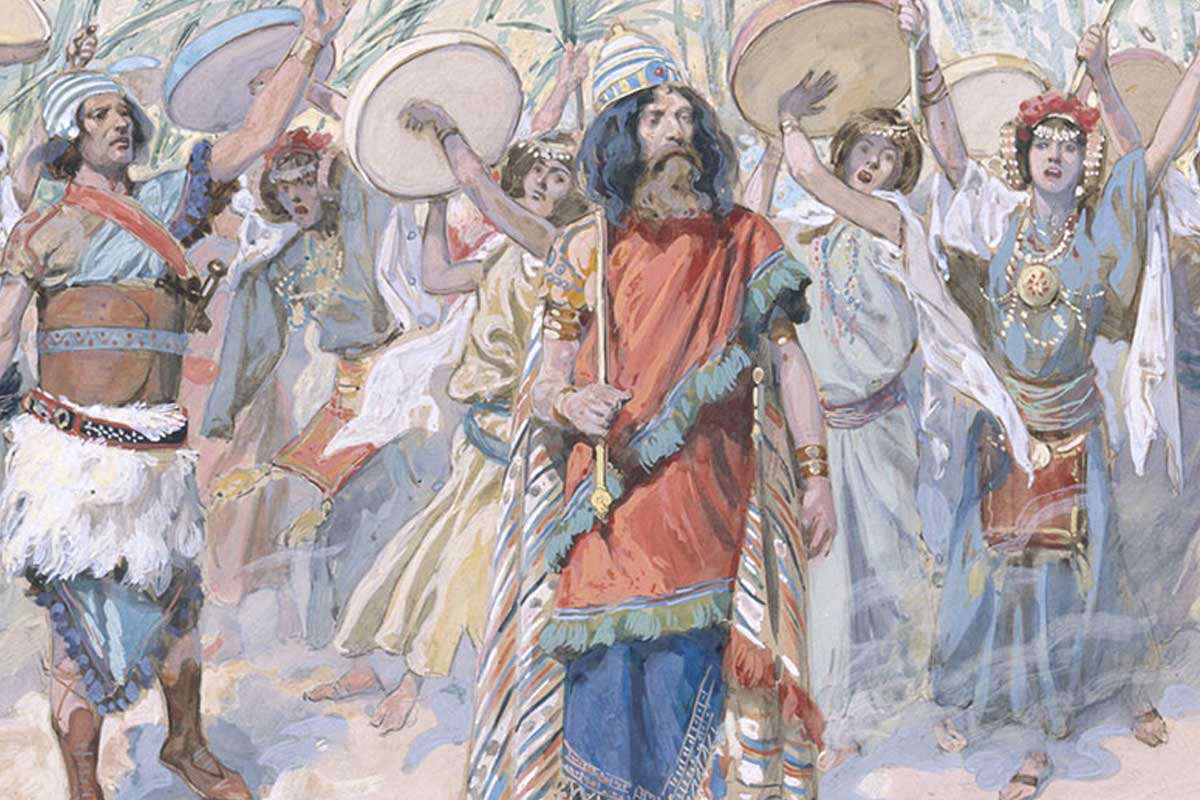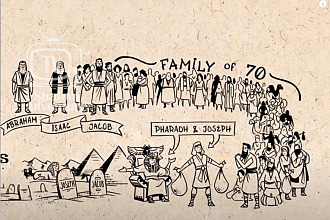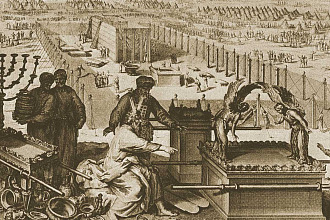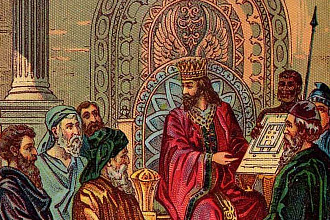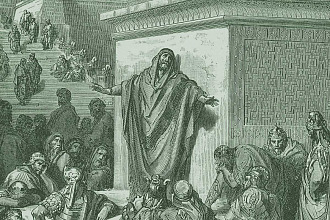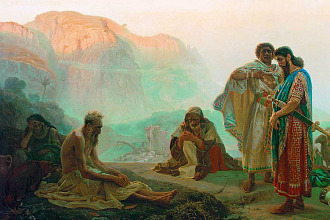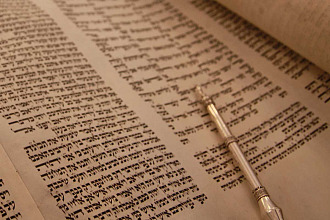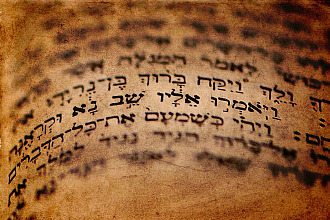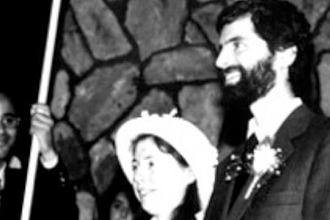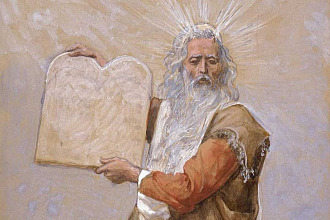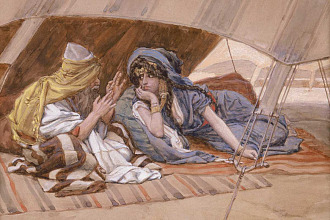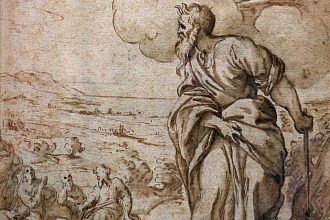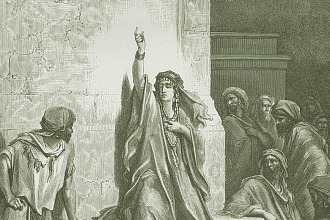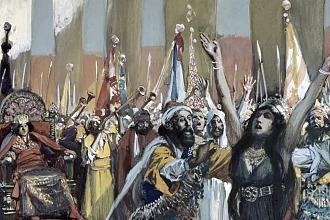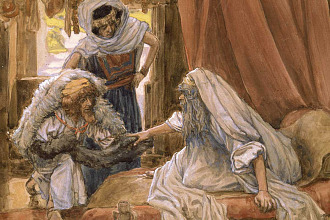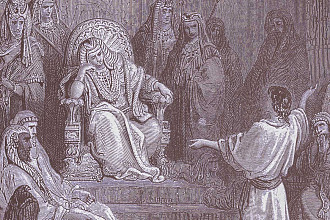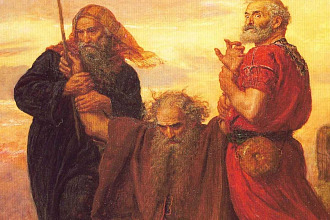David was one of the greatest kings in history - in fact, many believe he was one of the greatest men who ever lived. God referred to David as a man after His own heart.
We know this was not because David was perfect, but because he was quick to see his mistakes and come to God for forgiveness.
1. When Samuel was Prophet and Judge over Israel, what did the people ask for?
All the elders of Israel...said to him, “You have grown old... Therefore appoint a king for us, to govern us like all other nations.” 1 Samuel 8:4, 5
God had set us apart as His special people with His directions for us. But we wanted to be like everyone else.
2. How did Samuel and God feel about this request?
Samuel was displeased... Samuel prayed to the Lord, and the Lord replied to Samuel... it is not you that they have rejected; it is Me they have rejected as their king. 1 Samuel 8:6, 7
In wanting to be like everyone else we were rejecting God by not wanting to follow His ways.
3. Whom did God appoint as the first king of Israel in response to the petition of His people?
Samuel took a flask of oil and poured some on Saul’s head and kissed him, and said, “The Lord herewith anoints you ruler over His own people.” 1 Samuel 10:1
4. Saul did not follow the counsels of God. God rejected Saul, and sent Samuel to anoint David as the next king. What happened to David at that time?
Samuel took the horn of oil and anointed him...and the spirit of the Lord gripped David from that day on.1 Samuel 16:13
The Spirit of the Lord gripped David. It was the Spirit of the Lord upon David that made David great. We can also have the Spirit of the Lord. As Moses said: “Would that…the Lord put His Spirit upon” everyone (Numbers 11:29).
Saul still remained king for over 30 years after David was anointed to be the next king. At one time Saul had the Spirit of the Lord, but eventually he turned his back on God and rejected the Spirit. God was very merciful and long suffering with Saul as He is with each one of us. God is not wanting that any should perish, but that all would come to repentance.
5. After David was anointed to be the next king what major event in his life took place?
Goliath, the Philistine...stepped forward...the men of Israel...fled in terror. David said to Saul... Your servant will go and fight that Philistine!” But Saul said to David, “You cannot...you are only a boy...David replied to Saul...The Lord...will...save me from that Philistine.”
The Philistine...said to David, “Come here, and I will give your flesh to the birds...” David replied to the Philistine, “You come against me with sword and spear and javelin; but I come against you in the name of the Lord of Hosts...the battle is the Lord’s, and He will deliver you into our hands.” ...David...took out a stone and slung it. It struck the Philistine in the forehead; the stone sank into his forehead, and he fell face down on the ground. 1 Samuel 17:23, 24, 32-34, 37, 44, 45, 47, 49
The Spirit of the Lord gave David the courage to fight the giant. God gave David His Spirit before He called him to go and fight against the giant. God gives us His Spirit today so we can fight against the giant issues and problems that come against us.
6. Saul became jealous of David’s growing popularity. He did everything he could to destroy him. When David had the opportunity to kill Saul what did he do?
Saul took three thousand picked men from all Israel and went in search of David and his men...There was a cave there, and Saul went in to relieve himself. Now David and his men were sitting in the back of the cave. David’s men said to him, “This is the day of which the Lord said to you, ‘I will deliver your enemy into your hands...” David...said to his men, “The Lord forbid that I should do such a thing to …the Lord’s anointed—that I should raise my hand against him; for he is the Lord’s anointed.” David rebuked his men and did not permit them to attack Saul. 1 Samuel 24:3-8
This experience, above all others, showed David’s greatness. David had already been anointed by God to be the next king; Saul was acting like a lunatic by hunting David in order to kill him. David could have justifiably killed Saul and taken the throne. Nevertheless, David continued to show love and mercy toward Saul. David patiently waited for nearly 40 years for God’s will to be made manifest. David trusted in God’s timing, and God’s way of dealing with the situation.
7. What are some of Saul’s worst sins recorded in God’s word?
Saul died for the trespass that he had committed against the Lord in not having fulfilled the command of the Lord; moreover, he had consulted a ghost to seek advice, and did not seek advice of the Lord... 1 Chronicles 10:13, 14
Several sins are mentioned as being the cause of Saul’s downfall. He did not do what God commanded to be done. He did not seek God’s advice. He tried to speak to the dead, and he consulted a ghost. As we read in previous lessons this type of sin will eventually end in disaster. I pray that we are learning from these lessons to obey God, to do what He commands, to read His word, the Bible, and follow its advice, and not try to communicate with the dead.
8. Saul’s life ended tragically, yet David still mourned greatly for his enemy. David became king and Israel prospered. After many years of faithful service, David fell into sin also. But here is the difference between David’s sin and Saul’s. David repented and Saul did not. How did David express his sorrow for his sins? What specifically did David ask to not be taken away from him?
“Have mercy upon me, O God, as befits Your faithfulness; in keeping with Your abundant compassion, blot out my transgressions. Wash me thoroughly of my iniquity, and purify me of my sin; for I recognize my transgressions, and am ever conscious of my sin. Purge me with hyssop till I am pure; wash me till I am whiter than snow. Hide Your face from my sins; blot out all my iniquities. Fashion a pure heart for me, O God; create in me a steadfast spirit. Do not cast me out of Your presence, or take Your holy spirit away from me. Let me again rejoice in Your help; let a vigorous spirit sustain me. I will teach transgressors Your ways, that sinners may return to You.” Psalm 51:3, 4, 8-15
When David prayed to be “purged with hyssop till I am pure” he was referring to the blood of the lambs which were placed on the doorposts with hyssop during the first Passover. The blood of those lambs, like the blood of the lambs in the sanctuary service, represented the death of the Messiah washing away our sins, protecting us from eternal death. In no less manner, God has made provision for our sins to be purged and removed from us by the death of the Messiah.
David prayed that God would not take His Holy Spirit, Ruach HaKodesh, away from him because of his sin. David received the Holy Spirit when Samuel anointed him. It was the Holy Spirit that brought the conviction of David’s sin to his heart. It was the Holy Spirit that gave David courage and humility.
9. The Holy Scriptures tell us that the Messiah would come from the lineage of David. How did the Scriptures refer to the Messiah, who would show grace, mercy and peace to His enemies as David did?
For a child has been born to us, a son has been given us. And authority has settled on his shoulders. He has been named “The Mighty God is planning grace; The Eternal Father, a peaceable ruler”—In token of abundant authority and of peace without limit upon David’s throne and kingdom... Isaiah 9:5, 6
The Messiah would come as a child and yet would be known as “the Mighty God.”
10. Are there other places in the Scriptures where God is referred to as coming to earth as a child?
“Listen, House of David,” [Isaiah] retorted, “is it not enough for you to treat men as helpless that you also treat my God as helpless? Assuredly, my Lord will give you a sign of His own accord! Look, the young woman is with child and about to give birth to a son. Let her name him Immanuel. Isaiah 7:13, 14
Immanuel means “with us is God.” Would it still be a miracle if the mother of this child were just a young married woman giving birth to a son? She is specifically referred to as young because she is a virgin. The child is referred to as Immanuel because He is God with us, God manifested as a human. The Messiah was not a man who became God, He was God who became a man. This is not the first time God was manifested as a human. God was manifested as a human when He visited Abraham (Genesis 18), as well as when He wrestled with Jacob (Genesis 32).
11. What other names of God are found in scripture that signify His relationship to humanity?
I the Lord am your Savior, I, The Mighty One of Jacob, am your Redeemer. Isaiah 60:16
Note: The name Savior is from the word Salvation, in Hebrew it is ישועה and is pronounced Yesh-oo’-ah.
12. In His first advent, from what did the Messiah come to redeem us?
He shall come as redeemer to Zion, to those in Jacob who turn back from sin. Isaiah 59:20
The biggest problem in this world and in our lives is the sin problem. It is from this problem that the Messiah came to redeem us from.
13. How did He save or redeem us from our sins?
If any person... incurs guilt by doing any of the things which by the Lord’s commandments ought not to be done, and he realizes his guilt—or the sin of which he is guilty is brought to his knowledge...the sin offering shall be slaughtered… and he shall be forgiven. Leviticus 4:27-31
In all their troubles He was troubled...In His love and pity He Himself redeemed them... Isaiah 63:9
God the Messiah Himself redeemed us by becoming the sin offering for us. The Messiah came in His first advent to redeem us from our sins by dieing for those sins. He will come in His second advent to redeem us from the wicked who will be causing a time of trouble that is worse than anything that has been seen before.
14. Are there other times in the Hebrew Scriptures when God came to earth as a human?
Jacob was left alone. And a man wrestled with him until the break of dawn...Said the other, “What is your name?” He replied, “Jacob.” Said he, “Your name shall no longer be Jacob, but Israel, for you have striven with God and man (margin), and have prevailed.”…So Jacob named the place Peniel...” Genesis 32:25-31
Peniel literally means face of God.
15. Do the Hebrew Scriptures teach that God has a Son?
Nor do I possess knowledge of the Holy One. Who has ascended heaven and come down?... Who has established all the extremities of the earth? What is his name or his son’s name, if you know it? Proverbs 30:3, 4
Amazing as it might seem the Jewish scriptures say that God has a Son. They are one family; they are united. There is only one God family.
16. Are there other places where our God family refers to themselves in the plural form?
And God said, “Let us make man in our image, after our likeness... the Lord God said, “Now that the man has become like one of us...” Genesis 1:26; 3:22
This might seem shocking at first, but it is in the first chapter of the Torah, the very beginning of the entire Jewish Scriptures. The plural words “us” or “our” are used four different times showing how this one God family communicated with each other right from the beginning in the first book of the Hebrew Scriptures.
17. Where does God give us an example in His Scriptures of more than one individual still being considered as one?
Hence a man leaves his father and mother and clings to his wife, so that they become one flesh. Thetwo of them...the man and his wife. Genesis 2:23, 24
In the second chapter of the Torah, after God created two individual people, Adam and Eve, and brought them together as husband and wife, He tells us that when men and women marry the two people become one flesh. How is it to be understood that a husband and wife become one flesh? Certainly they don’t physically become one flesh with one head, one mouth, one nose, etc. But they are one in heart, one in spirit, one in purpose. They are to be united in their goals and plans, walking and working together as one unit. This is what it means in the Shema when it says that God is one. God is one in the same way a family is one, even if it has three people in the one family. God, the Holy Spirit, and God the Messiah are one God family even though they each have different responsibilities. They are united. They work together as having one mind, one desire, one plan, one purpose, one goal. One rope has three strands, but it is still considered one rope.
18. God’s name reveals that God is one, though having the embodiment of three family members.
The Hebrew word “El” means God singular, as it is used in the words: “Beth-el,” which means “House of God,” and “Peniel,” meaning “face of God.” In Hebrew, when we want to make a masculine word plural we add the Hebrew letters “yod and final mem” (pronounced “eem”) onto the end, just as in English we add an “s” to the end of words to make them plural. The Hebrew word most used in the Hebrew scriptures for the name of God is אלהיםand is pronounced El-o-heem. The “eem” sound on the end makes the name of God plural. Even in God’s name we see the plurality of the single God family.
We often use the word “one” in the plural sense. We say: “one family house,” “one flock of geese,” “one cluster of grapes.” These are examples of several objects being considered one as they are united together as one unit. The United States of America is comprised of many states yet it is one nation. God is not three different Gods competing against each other as in Greek mythology. God is one God comprised of three individual beings working together as one unit as the words “Eloheem,” “us,” and “our” indicate.
We have been taught for so long that God is singular that these texts from the Torah and other parts of the Bible might seem hard to understand. If this concept of God being one family is new to you, pray and ask God for wisdom. Read questions 8-18 again.
You may have made mistakes like David did, but you can be a person after God’s own heart as David was, by being quick to confess your mistakes to God and submitting to His guidance and leadership.
David’s experiences and writings are mentioned in at least five (5) different books in the Hebrew Scriptures. We certainly could not cover it all here. I encourage you to read all the accounts of his life from the Scriptures themselves along with the psalms that he wrote.
The next king of Israel, David's son Solomon, was also a very prolific writer. He is the topic of your next lesson,"Solomon the wise man."
This lesson is adapted from "Jewish Discoveries," by Jeff Zaremsky, to buy the printed book, click here.

